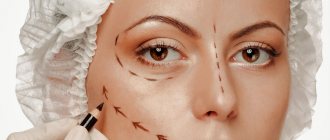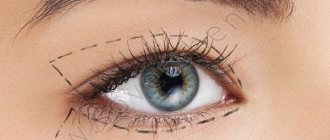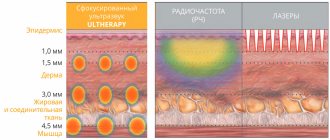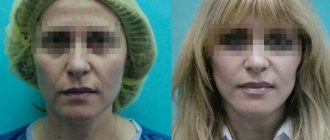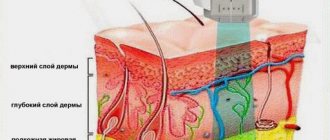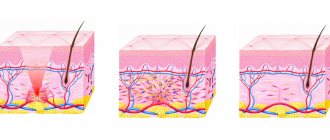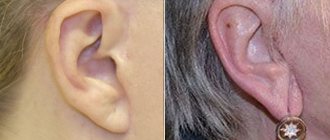Plastic surgeries that were performed to tighten facial skin have long been a thing of the past. Any surgical intervention on the skin can be quite traumatic and lead to serious complications, including the development of inflammatory processes.
Today, MAX-lifting, which is the latest development of American and Colombian cosmetologists, is more popular. It is with this procedure that you can get maximum effect and minimum trauma to the skin.
Facelift is an effective method of facial rejuvenation
A highly effective way in the fight for a youthful face is facelift.
This plastic surgery allows you to:
- return a clear oval face
- smooth out wrinkles
- tighten your neck
The method of performing this plastic surgery differs in each specific case.
Here I will talk about the two most popular facelift methods - SMAS lifting (SMAS ) and max lifting (MACS) . Very often patients want to know what the difference is between them.
Advantages
MACS lifting has gained such popularity due to its advantages over other methods. Surgeons pay special attention to the safety of plastic surgery. SMAS lifting can lead to serious complications, however, a properly developed surgical technique eliminates negative consequences and risks.
The following are also considered advantages:
- high efficiency of plastic;
- minimal trauma due to all manipulations being performed through small incisions;
- possibility of tightening the skin of the face, chin and neck;
- fast recovery;
- low likelihood of complications;
- maintaining natural facial expressions;
- application of invisible seams.
SMAS lifting
Smas lifting is a plastic surgery to lift the face, during which muscle tissue is affected and moved to the correct place. Rejuvenation in this way can be carried out at any age if there are indications, while maintaining all facial expressions and previous facial features.
When performing SMAS lifting, general anesthesia lasts from 2.5 to 4 hours. During the operation, the surgeon makes incisions in the pre-auricular area, behind the ear, shaped like the letters V, J or S.
The shape of the incisions for SMAS lifting is selected before surgery depending on individual correction needs. Then the detachment of the smas layer (aponeurosis) begins, excess skin is removed and fixed with sutures
Photos before and after SMAS - lifting. My patient looked 10 years younger and there were no visible signs of surgery.
Who should not have plastic surgery?
MACS lifting is a safe procedure, but it is invasive, for this reason there are contraindications to its implementation. To exclude contraindications and prevent complications, diagnostics are carried out before surgery.
Macs-lift is not recommended for the following indications:
- tendency to tissue scarring at the site of the suture;
- immunodeficiency;
- exacerbation of an infectious or viral disease;
- blood pathologies (especially bleeding disorders);
- oncology;
- respiratory system diseases;
- pregnancy or lactation;
- dermatological diseases that appear on the face;
- mental illnesses.
Relative contraindications can be eliminated, after which plastic surgery is performed. If there are absolute contraindications, surgery is excluded.
MAX lifting
Max lifting is a more gentle method for lifting the middle and lower areas of the face. With this surgical technique, minimal incisions are made, and the oval of the face and chin are delicately tightened.
The MAX lifting procedure is slightly different from a more serious intervention - a circular facelift. After an incision in the pre-auricular area, the skin peels off. Then comes tissue lifting to correct and return to its original position the sagging tissues of the middle and lower part of the face using sutures with non-absorbable thread. Next, excess skin tissue is excised and cosmetic stitches are applied.
Cost of services
MACS lifting is a safe and effective method of rejuvenation. The result largely depends on the work of the surgeon. The Correct Clinic provides MACS lifting services by highly qualified surgeons who have experience in performing plastic surgery using innovative techniques.
The price for aesthetic facial plastic surgery depends on the complexity of the operation, as well as the application -
In order to do a Macs-lift, you should start with a consultation with a plastic surgeon. Pre-registration for an appointment with specialists at our clinic is available on the website and by phone +7-917-500-500-3.
Differences between SMAS and MAX lifting
The main difference between these seemingly similar procedures is the area of impact.
In the case of SMAS lifting, a complete and more thorough face lift occurs, while with MAX lifting, only the middle zone and, to some extent, the lower zone of the face are tightened.
Thanks to its effect on the deep layers of the skin, the smas lifting procedure gives a long-lasting effect that is noticeable immediately after the operation.
The use of MAX-lifting also gives a quick and pronounced positive result in lifting the mid-face area.
Sutures for a circular facelift are applied horizontally, which complicates the recovery process, thereby lengthening the rehabilitation period.
The incision that is made during a max lift runs from the hairline above the ear, along the front surface at the level of the tragus, and ends in the area of the earlobe. With the conventional lift method, the incision continues behind the ear, which is much more traumatic for the patient.
Combination with other procedures
Surgical facial plastic surgery often cannot be combined with other methods of aesthetic correction. MACS lifting is one of the few plastic surgery techniques that allows for the simultaneous implementation of several procedures to eliminate defects on the face.
MACS lifting can be combined with the following types of plastic surgery:
- forehead lift (endoscopic);
- chin liposuction (double chin removal);
- blepharoplasty.
These techniques can achieve complete rejuvenation of all facial areas. But the decision about complex plastic surgery is not made independently. The final answer about the possibility of simultaneous correction in several ways is made by the surgeon.
Results and features of Max lifting
- Safety and effectiveness
- Vertical seams smooth out nasolabial folds
- Correction of the cervicomental angle
- Significantly shorter recovery time than with a conventional facelift procedure
What operations can facelift operations be combined with?
To achieve the maximum rejuvenation effect, SMAS lifting is most often combined with blepharoplasty (eyelid surgery) or platysmoplasty (neck lift).
The term “MAX-lifting” (“MACS-Lift”) refers to minimal access facelift operations (with a short incision). Due to their low invasiveness, such operations are widely known under other terms - “short scar lifting”, “weekend lifting” and even “Hollywood bitch lifting”. Hollywood stars, as you know, always look impeccable and cannot hide from their fans for long. They are always busy, afraid of pain and do not like to waste money. This is probably why short scar lifting appealed to them so much.
MAX-lifting has a number of advantages that elevate it to the forefront of minimally invasive surgery:
- Low morbidity
- Pronounced lasting effect
- Natural result
- Small, almost invisible traces of surgery
- Low likelihood of complications
- Short and almost painless rehabilitation period
The affected areas undergo significant reconstruction - more pronounced than can be achieved with thread lifting. A clear oval of the face is formed, the cheekbones acquire a defined appearance. At the same time, thanks to strictly vertical lifting of soft tissues, the face retains its natural appearance, the patient does not risk getting a overtightened, mask-like face with motionless facial expressions. After the operation, short scars remain in the parotid area, similar to streaks. Later they almost disappear.
Today, several options for MAX lifting are used: S-, J- and V-lifting. All three operations are gentle, and in general they are similar to each other. There are only slight differences in the technique of execution - the Latin letters S, J and V in their outline resemble the shape of the cuts performed. The following zones are corrected:
- S-lifting – lower third of the face
- J-lift – oval face and neck
- V-lifting – lower and middle thirds of the face and neck
The main indications for MAX lifting are mild or moderate ptosis of the soft tissues of the face, jowls, pronounced nasolabial folds, sagging neck tissue, the presence of excess skin in the neck area and other age-related changes. The main contingent of patients are women aged 38 to 50 years, for whom endoscopic lifting no longer solves the aesthetic problem, and it is too early to do a circular lift.
In case of loose tissues and the presence of deep wrinkles, especially in the lower third of the face and neck, short-scar lifting is not always effective if it is used as the only correction method. In these and some other cases, the doctor recommends using it in combination with operations and procedures such as fractional facial rejuvenation, lipofilling, contour plastic surgery, eyelid surgery, endoscopic lifting of the upper and middle third of the face - the complex effect provides a good result.
Before surgery, patients undergo a standard examination. On the day of surgery and the evening before, you should refrain from eating.
The operation is performed under local anesthesia, sometimes under general anesthesia. Its duration is usually 1.5–2 hours. During the tightening process, only superficial structures that do not contain large vessels and nerves are affected.
After the operation, hospitalization for one day is required. The patient must wear a compression bandage until the stitches are removed. The rehabilitation period is 7–10 days, which is significantly shorter than the recovery period after a classic facelift operation. During this period, bruising and swelling will subside. Over the next 1.5–3 months, skin folds in the behind-the-ear areas will resemble the past operation, then they will smooth out.
The aesthetic effect appears two weeks after surgery, reaches a maximum after 2–3 months and, due to stable fixation of soft tissues, lasts for 10 years or more.
Indications and contraindications
The indications are:
- Changing the oval and facial features.
- Descent of soft tissues of the lower and middle areas of the face.
- Decreased turgor and elasticity of the skin in the face and neck.
- Drooping corners of the mouth and deep nasolabial folds.
- Both methods are aimed at eliminating age-related changes in the skin, its sagging and sagging in problem areas. Both methods cope well with the tasks of eliminating signs of aging and returning a healthy, toned and elastic appearance to the face.
Contraindications are diseases that are standard for all types of plastic surgery.
How is the operation performed?
Before performing MAX lifting, the patient must be given local or general anesthesia.
So, the rejuvenation process begins with doctors making an incision in the area of a small cartilaginous protrusion on the outer ear, doctors call this place the tragus. Then the skin is separated and the aponeurosis (tendon) is tightened. After this, purse string sutures are carefully placed on the frame of the muscle layer and excess areas of the skin are excised. At the end of the rejuvenation procedure, specialists apply cosmetic stitches at the incision sites.
Best materials of the month
- Coronaviruses: SARS-CoV-2 (COVID-19)
- Antibiotics for the prevention and treatment of COVID-19: how effective are they?
- The most common "office" diseases
- Does vodka kill coronavirus?
- How to stay alive on our roads?
Rehabilitation
As after any intervention by a plastic surgeon, swelling and bruising may appear on the face for several days, which disappear within 1-2 weeks. Sutures are removed 10–12 days after surgery, which depends on the speed of tissue healing in each individual patient. For 2 weeks, the patient is not recommended to visit the sauna, bathhouse, sunbathe or engage in strenuous physical exercise. After this, the person can return to work, leading a normal lifestyle.
The initial results of lifting can be assessed after 1-2 weeks, but the full effect of lifting can be assessed only after 2 months.
Facial nerve damage
They rightly write on the Internet about the danger of damage to the facial nerve during SMAS or Mendelssohn lifting. This is often the sin of cosmetologists who incline patients towards a thread lift, and who show horrific results of damage to the facial nerve.
A damaged facial nerve, unlike a vessel, cannot simply be sutured so that it works as before. To restore it, you must have microsurgical techniques, be able to isolate the nerve, and have experience in such manipulations.
90% of plastic surgeons cannot distinguish the facial nerve from other facial structures, so they do not undertake SMAS or Mendelssohn lifting. And if they do, they turn to colleagues who know how to perform such operations for help—surgeons like these call me all the time.
I came to plastic surgery from maxillofacial surgery and oncology. I repeatedly deliberately cut the facial nerve in order to pull out another tumor, then sewed it back up. Sometimes it is impossible to restore the nerve, but this is a small price to pay for life. For me, surgical interventions on the face of any size are routine. The most difficult thing in plastic surgery is to understand what the patient wants without imposing your ideas of beauty on her.
Reviews
The opinions of cosmetologists and clients regarding the max lifting operation are clear - this is the most effective rejuvenation procedure, which in the shortest possible time allows you to restore youth, freshness and beauty to your facial skin.
Here is one of the reviews from grateful clients:
Nadezhda, 49 years old “For the last five years, my reflection in the mirror has upset me. Wrinkles on the face became more and more visible, and “jowls” appeared on the cheeks. The cosmetologist said that only plastic surgery would help correct my age-related changes. The fear of a long rehabilitation period and pain constrained my desire to go under the surgeon’s knife. But after learning about the max lifting technique, I took a risk and did not regret it. Anesthesia completely eliminated any fear of pain. Minimal incisions reduce the risk of serious swelling and pain. The first days it was unusual and quite strange to look at myself in the mirror, since slight swelling and bruising still persisted. But everything passed very quickly. And now a radiant, young and beautiful woman is looking at me in the mirror.”
Share on social media networks
Is preparation necessary?
Accordingly, in order to exclude some of the listed contraindications, it is necessary to undergo preparation for the procedure.
Preparation consists of mandatory tests for laboratory research:
- general urine and blood tests;
- blood test for biochemical composition;
- blood test for infections;
- possibly a blood clotting test.
In addition, you need to do an ECG to assess the endurance of the heart for the upcoming operation. The doctor may also prescribe fluorography. This stage is carried out on a paid basis in a clinic or in a public medical institution.
At the stage of preparation for max-lifting, it is necessary to decide on the type of anesthesia. For women, it is recommended to schedule the operation on a date that does not fall on the days of menstruation.
Two weeks before the scheduled operation, you should refrain from smoking and drinking alcohol, and also exclude from your diet foods that act as a factor that changes the composition and properties of the blood. In this case, on the day of surgery, nutrition and fluid intake are generally excluded.
Possible complications
MAX-lifting is a technique that reduces all postoperative risks to a minimum. But sometimes they cannot be avoided, which is considered a normal reaction of the body to tissue trauma.
What are the most common complications:
- swelling, the appearance of hematomas - goes away on its own after a week; to speed up the process, you can undergo a course of physiotherapy with the doctor’s permission;
- infection - is a consequence of the surgeon’s incompetence or improper care of the postoperative wound, and is eliminated with the help of antibacterial ointments;
- pain in the facial area almost always develops; it can be eliminated with the help of analgesics.
If severe swelling, inflammation and redness of the skin in the suture area, as well as suppuration, appear, you should immediately consult a doctor. The inflammatory process is easier to eliminate at an early stage of its formation.

